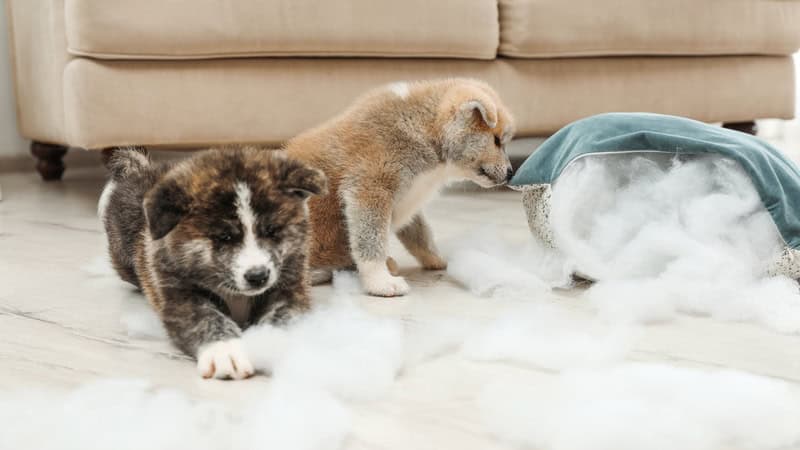‘Our barking dog’s demands need to stop!‘
A barking spaniel, scavenger kitties, and wee-wee pad permissions

What is the barking dog saying, anyway? Pet advisor Cathy M. Rosenthal answers the owner of a demanding Cavalier King Charles spaniel, a cat owner whose feral kittens know no food boundaries, and a Yorkie dad whose dog has developed an odd wee-wee pad habit.
Dear Cathy,
Kenya is a 2-year-old Cavalier King Charles spaniel that we have had since she was a puppy. This is our third Cavalier. She is much more vocal than the other two dogs. She barks at us and demands we let her in our backyard. She doesn’t listen when we tell her to come in sometimes. What can we do to get her to quit barking all the time?
– Jimmy, Tucson, Arizona
Dear Jimmy,
I don’t think she is trying to be demanding. I think she is letting you know what she wants and the only way she has learned to communicate with you is through barking.
If the request is outside the scope of her bathroom habits and you know she doesn’t need to go out or you don’t want her to go out for whatever reason, begin training her with a phrase, like, “not now.” Simply say the phrase and ignore the barking. When she stops barking, call her to you (you will need to work on the “come” command as well), ask her to sit and then give her a treat. If she doesn’t stop barking, walk over to her, stand in front of her, step toward her, and point your arm over her head and say, “not now.” This will require her to turn and walk in the other direction, which immediately stops the barking. With training, she will learn what “not now” means and will stop barking when you say it. Then give her a puzzle toy to keep her busy.
Help! The pooch likes the nanny better!
 Dear Cathy,
Dear Cathy,
I have five kittens; two are feral. The two feral kittens are like termites. They eat everything. They grab from the table constantly. They act as if they haven’t eaten ever. They break into bread and cheese packages. Is something wrong with them?
– Heidi, Saint James, New York
Dear Heidi,
Feral cats learn to scrounge for their food or catch live prey and they may have developed some aggressive eating habits. If that is the case, keep your food in the house secure when you can’t be around to supervise until they learn they will get more than enough food from you.
But I wonder if they may have tapeworms. I am sure they didn’t have flea protection on the street, and fleas are a major cause of tapeworms. Tapeworms eat the nutrients found in their host’s intestines, so your kittens may be malnourished right now, and could even be losing weight.
Tapeworms are obvious, so check their stools for the segmented worms. Whether you find any or not, I would get these felines checked out by a veterinarian.
10 gadgets to make pet care easier
 Dear Cathy,
Dear Cathy,
Our 7-year-old Yorkie, Missy (Mistletoe), has always been good with using the wee-wee pad since she was a pup. We take her out for a walk twice a day, but the wee-wee pad is for her use at other times. She always gets a treat when she uses it. Recently, she will sometimes stay about 10 feet away from the pad and bark at us. She will wait for us to go toward the pad, almost like giving her permission, and then she will go ahead and do her business. Is this normal or typical?
– Tom, Westbury, New York
Dear Tom,
While that’s not necessarily normal, it’s not a cause for concern either. It’s hard to know what our pets are sometimes trying to tell us, but she is definitely trying to tell you something. Somewhere along the way, she may have gotten it into her head that she needed to ask permission before using the pad. She also may have seen something near the pad that scared her or is afraid of the pad itself for whatever reason.
It’s great you give her a treat for using the wee-wee pad. I would train her with a command to use the wee-wee pad, by saying “go to the wee-wee pad,” every time you see her approaching or using it. If you do that, you can eventually say the phrase every time she starts barking, and she will know what you want her to do.
In the meantime, watch her habits closely to see if anything else has changed. Often, when animals change their normal routine, there can be a health problem connected to it. Get her checked by a vet to make sure she doesn’t have a urinary infection because that can cause some animals to develop strange habits around their bathroom routines.
Cathy M. Rosenthal is a longtime animal advocate, author, columnist, and pet expert who has more than 25 years in the animal welfare field. Send your pet questions, stories, and tips to cathy@petpundit.com. Please include your name, city, and state. You can follow her @cathymrosenthal.
© Tribune Content Agency, LLC
Products linked from Boomer to Amazon have been vetted and recommended. As an Amazon Associate, Boomer Magazine earns from qualifying purchases of linked products.


